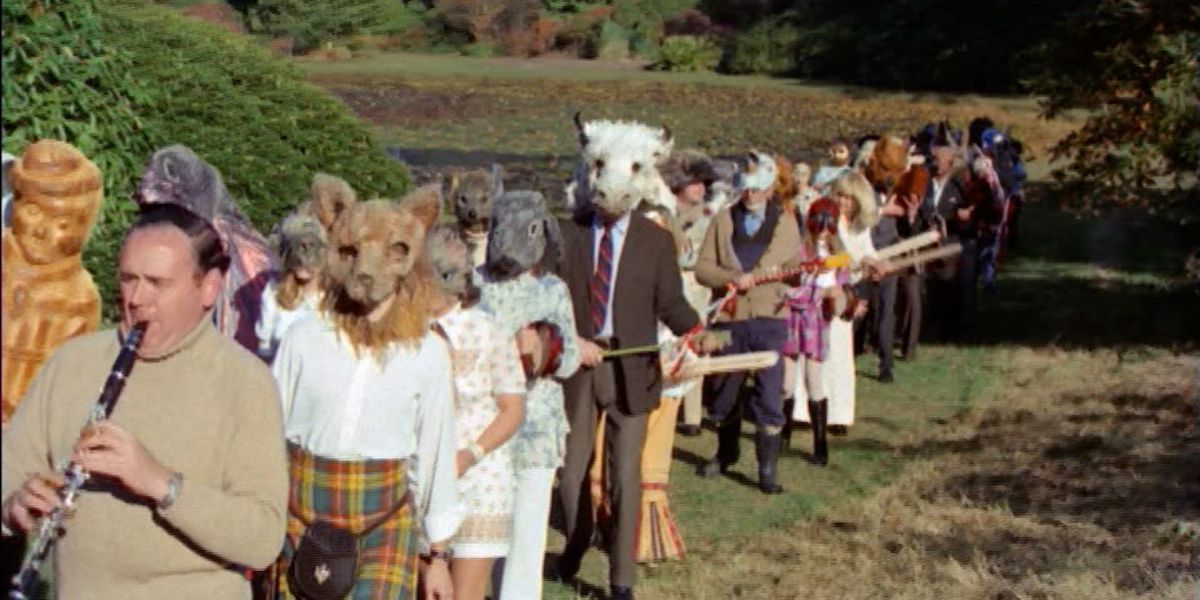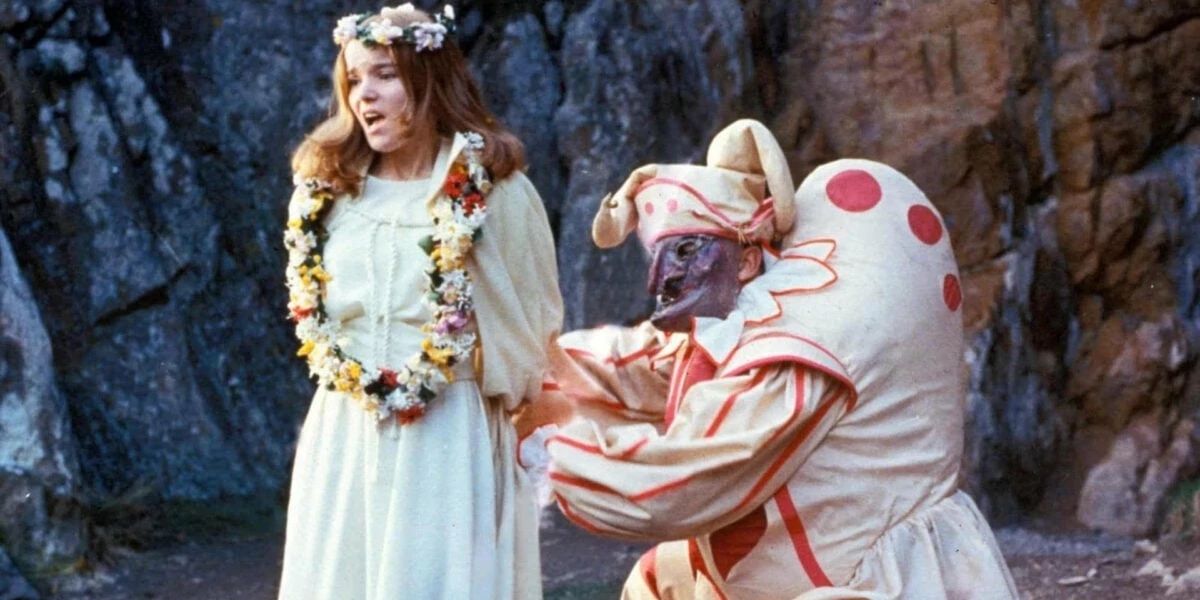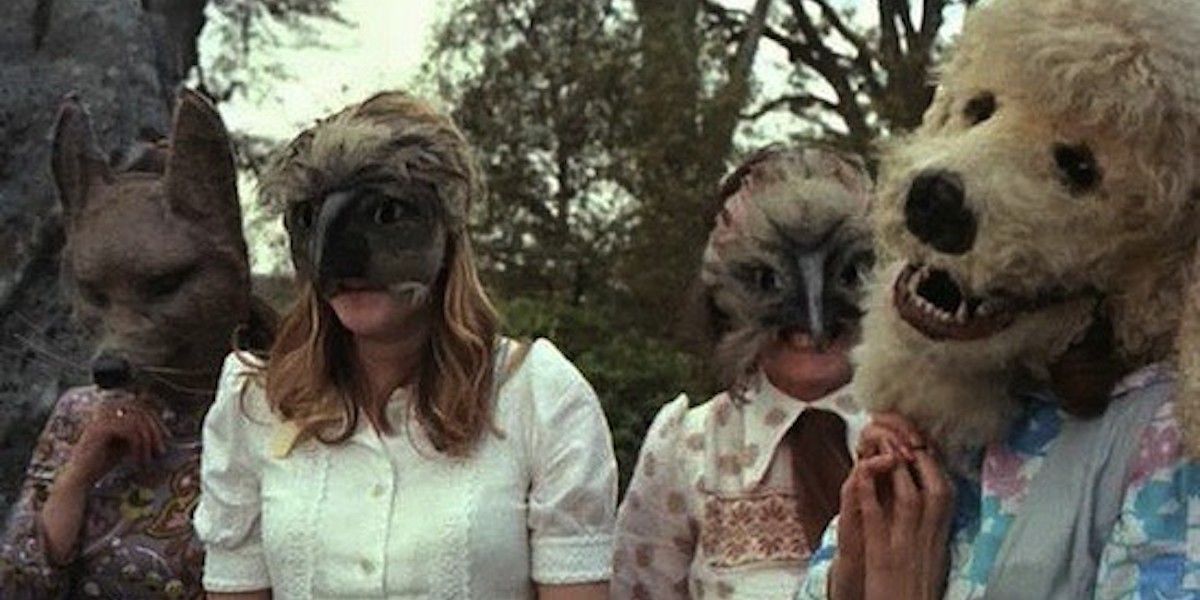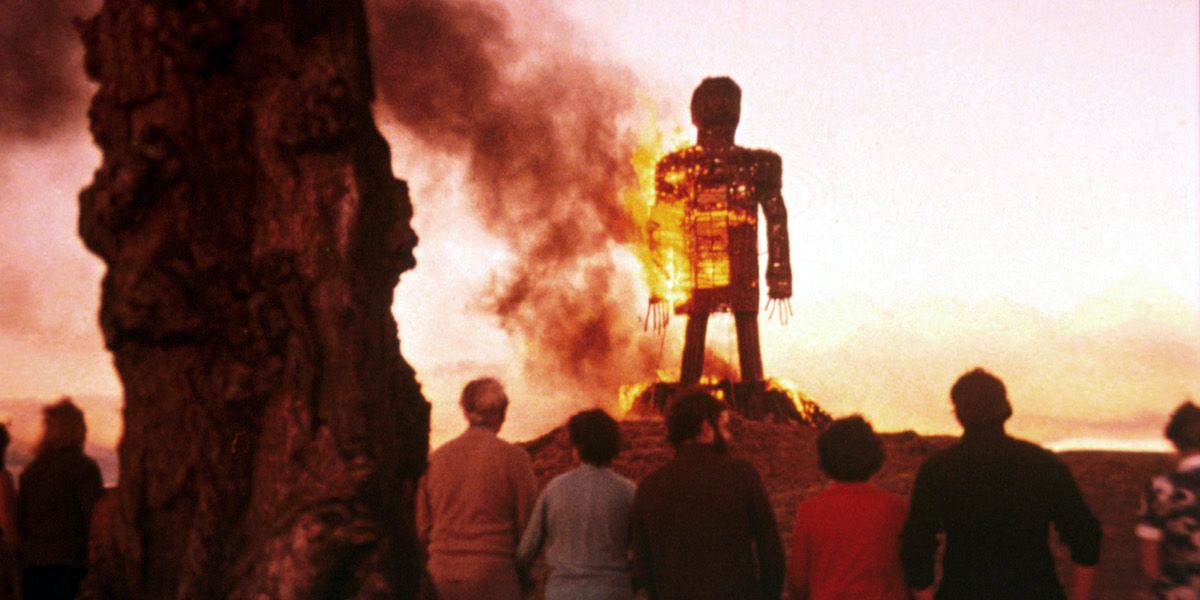The Wicker Man (1973) is an early entry of the folk horror subgenre. It gave Christopher Lee his favorite role, keeping the danger from his portrayal as Dracula but leaving behind bloody fangs for something more concealed. This subtlety isn’t only for his character. Director Robin Hardy and screenwriter Anthony Shaffer use subtlely throughout the whole movie, making its shock ending that more shocking. The true power in unnerving the audience is not so much that fiery visual. It’s the music heard throughout. Italian-American musician Paul Giovanni created the soundtrack with musical support by British band, Magnet. Instead of relying upon dialogue exposition, the featured songs let the audience in on the pagan customs central to the story. From sexually-charged tunes to more somber pieces, the folk music disarms the movie’s audience as much as the climatic sacrifice succeeds in terrorizing.
Police Sergeant Howie (Edward Woodward) arrives at the island of Summerisle and quickly experiences the strange lifestyle of its pagan residents. As a devout Christian, this man of law and order is continuously made to be the outsider. What is baffling to him, is absolutely normalized to the island’s young and old. He’s searching for a missing girl, but it’s all an elaborate ploy to entrap Howie. The islanders plan to sacrifice him to their sun god, with the hopes it will help the upcoming crops.
Early on, Woodward’s character is standing within the pews of a church, not having left for the seaplane yet. Together with fellow parishioners, he sings the hymn, “The Lord’s My Shepherd.” It’s full of passion, the words meant to offer comfort. The church’s organ echoes all around. But from everyone’s wooden stance, it’s all so rigid. In fact, it could be considered joyless, despite the pious sense of fulfillment on display. Howie is standing next to a woman who is his fiancée, a character who doesn’t show up after this. For her one appearance, they share no kiss or any kind of intimacy, adding on to the conservative aspects to Howie's character. This isn’t the last time “The Lord’s My Shepherd” is heard. But when it returns, the circumstances are far different and lonelier.
Once Howie is in the sky, Giovanni’s folk music begins with “Corn Rigs,” the vocals also performed by the composer. “I loved her most sincerely, I kissed her o'er and e'er again, among the rigs of barley,” and so it goes. The lyrics are taken from the poetry of 18th-century Robert Burns, old words like the old religion being practiced on the approaching island. There’s a twang from an acoustic guitar, making it sound quite peaceful. There is no obvious hint of the menace to come. Instead, there are hints to the sexual liberation of the pagans. Listening to the lyrics, it tells of a pair of lovers who use barley rigs as cover, a means to hide from moralistic eyes such as the Police Sergeant. On first watch, it may not seem evident, but there is an unsettling intention behind the music. It plays over the establishing shots captured by cinematographer Harry Waxman. There is so much ocean the plane passes over, Summerisle is truly cut off from the rest of the world.
On land, Howie enters the Green Man Inn, getting stuck in the middle of a sexually-charged, rowdy chorus. Male islanders holler to “The Landlord’s Daughter,” directed towards Willow (Britt Ekland), the daughter of the Inn’s owner. But she watches in happiness. The Police Sergeant is the one unamused, listening to, “And when her name is mentioned, the parts of every gentleman do stand up at attention.” The loud voices instantly make Howie look uptight and out of place. Sex is on the mind of this community, but they don’t always lean towards being raunchy. As Howie heads to a guest room, the patrons downstairs ease their energy. Christopher Lee’s Lord Summerisle then makes an appearance, introducing Willow to a young man who she takes to her bedroom. The patrons glance upstairs as they sing to “Gently Johnny,” a ritual-like song acknowledging the bedroom antics. All the while, Lord Summerisle monologues over two snails mating outside, making the connection between nature and sex for this community. Howie tries to sleep but the sounds coming from Willow’s room keep him tossing and turning. Nothing explicit is shown but the patrons singing, “I put my hand all on her breast” and “I put my hand all on her thigh,” leave little to the imagination. For Howie, this premarital sexual freedom is startling. All around, humans and creatures alike are embracing what this God-fearing man denies himself.
The following day, the Police Sergeant watches a teacher and pupils dance around a maypole on the school yard. No wooden pews keep them in place, those have been left in the old church behind the festive maypole. The song is innocent at first, quick-paced and child-like. Then it continues. The kids merrily sing to sex, birth, and rebirth. Once someone dies, the islanders believe they are reincarnated as a tree, becoming one with the nature they worship. Upon a closer look, the school children are separated by gender. The boys are outside, worshiping the maypole. Inside the school house, the girls are listening to Miss Rose (Diane Cilento) talk about the phallic symbolism associated with it. On the mention of this, Howie storms into the classroom. He berates the teacher Miss Rose for tainting the young minds with what is essentially the topic of reproduction. The adults and now the children act in ways Howie can’t grapple with. And they do so with so much pleasure. Miss Rose holds another role, leading to a more mysterious entry on Giovanni’s soundtrack.
The soft blows from a flute introduce “Fire Leap.” The school teacher watches over a group of nude women in a fertility ritual, surrounded by majestic standing stones. One by one they jump over a fire, chanting, “Take the flame inside you, burn and burn belong.” It’s very dream-like, made more so with the women’s voices low and whispery. Seeing the naked women in broad daylight makes Howie uncomfortable on another level. Then he gets targeted more directly.
At night, Howie performs a routine prayer before bed. But locking himself in the room won't keep Willow from performing “Willow’s Song.” In her nearby bedroom, she falls into a strange waltz, hands pounding on the walls. “Heigh ho, I am here. Am I not young and fair?” Willow quietly sings along to the plucks from an acoustic guitar. Her voice is angelic, but to Howie, it certainly sounds more like a siren. But “Willow’s Song” is insidious for its goal. Can the islanders break this man down, make him throw away his own beliefs? Don’t forget he is engaged. The Police Sergeant turns sweaty as he joins in on the “dance”, his body and mind fighting the temptation. Getting close to the walls and the door, Howie forces himself into bed. This seals his fate. He is the perfect virginal sacrifice the island needs.
The morbidly grand finale shifts the ground from under Howie’s feet. The Police Sergeant is forced into the towering Wicker Man structure. In an attempt to be defiant, he yells the hymn from the start of the movie: “The Lord's my shepherd, I'll not want!” It falls to deaf ears as Lord Summerisle leads the islanders in a gleeful dance to “Sumer is icumen in.” Gone is the tranquility Howie experienced at church. The boisterous singing from the pagans is too loud, it drowns out his holy hymn. Animals also trapped in the wicker trap scream as flames reach them. These two sounds, one of joy and the other of pain, is what Howie is stuck with hearing as he perishes.
Giovanni’s music is as unrepressed as Howie is not. The soundtrack plays along with this, slowly revealing the darkness of Summerisle. Until that burnt offering, everything is simply obtuse to Howie’s faith. The National Theatre of Scotland adapted the 1973 movie into the musical, “An Appointment with the Wicker Man,” with the impact of Giovanni’s music not lost on its creators. Writer Greg Hemphill stated to The Guardian, “...everyone is quite serene and jolly. In fact, it almost works as a great advertisement for paganism, because it makes it look so lovely." Up to a certain point, that is. What Giovanni's soundtrack does so well is allow audiences to experience the seductive and bewitching world those in Summerisle see for themselves.





